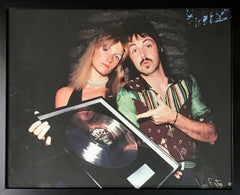![]() One of the tricky parts of collecting RIAA record awards is avoiding the fakes that do occasionally exist in the marketplace. Here are five tips that can help you avoid buying a fake RIAA award:
One of the tricky parts of collecting RIAA record awards is avoiding the fakes that do occasionally exist in the marketplace. Here are five tips that can help you avoid buying a fake RIAA award:
1. Certification: Does the certification date versus the award type make sense? This can be a very tricky area because a recording is not certified officially by the RIAA until the record label submits the paperwork. In some cases, there can be years-long gaps before Platinum was issued on recordings which in reality quickly sold numbers that were at the Platinum level. This is fairly common situation with certain Beatles releases, for example. You can check the date that a recording was certified at what level (Gold®, Platinum®, Multi-Platinum™, Diamond) at the RIAA website. You can search any recording by artist or song title to see the actual certification dates at riaa.com/gold-platinum/. This tells you what type of RIAA award should exist for the recording. The database can be challenging to use and is very particular. Use of correct upper case letters, ampersands and other characters can be important to find a listing at times.
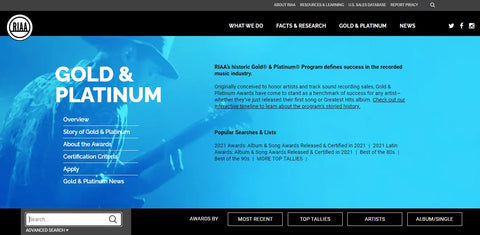 The official RIAA website at riaa.com contains a wealth of information...
The official RIAA website at riaa.com contains a wealth of information...
2. Construction: Is the award constructed properly corresponding to its RIAA award era type based on its' certification date? When you see award collectors referring to "white mattes," "floaters" and "R holograms" for example, these different eras are what they are referring to. There are no less than eight distinct award eras, with some other minor changes that occurred within these award eras as well. There are only around 20 companies over time who have been authorized to make RIAA awards (only one from 1964-76 and only two from 1975 through the mid-80s), and it is important to know who they are, what eras they made awards in and how they constructed them. Things to look for include: Is the plate worded correctly? Are the matte cuts correct? Is the correct label for the time period on the record? Is the frame material correct?
For a full explanation of eras, manufacturers, and details of authentic award construction for each era with photo examples, see our MusicGoldmine.com Record Award Guide here. If you're assessing a 1964-74 "white matte" award like the one pictured below, check out our article here that exclusively explores those awards, including providing photos of their internal construction and key details to help you determine authenticity.
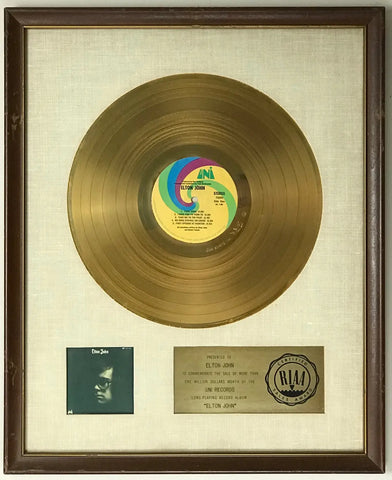
Interested in 1975-81 "floater" awards like one in the photo below? Check out our article here that exclusively explores those awards.
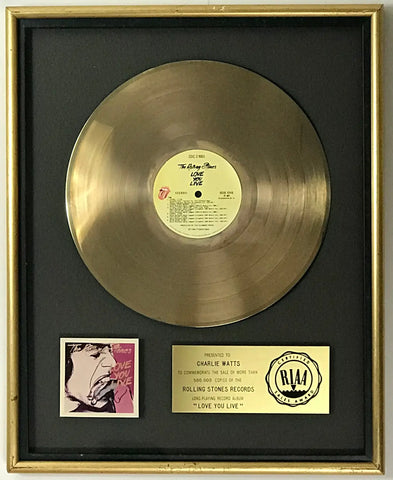
While we won't reveal every single detail in these guides so as to avoid arming fake award makers with everything they need to know to deceive consumers with their creations, we do cover a great deal.
3. Condition: This is an important one. Is it possible that an award made in 1975, after being displayed on various and sundry walls for about five decades is in pristine condition? Yes. Is it likely? No. If an award that should be this age doesn't exhibit some signs of matte fading, scratches and mars on the frame, aged backing paper, and possibly even at least some minor discoloration of the gold or platinum disc, it likely isn't real. Even an award made in the 1980s should exhibit appropriate wear. We have seen examples of genuine awards in the late 80s and 90s that are in truly excellent condition, but it is quite rare to see this. Every award has to be looked at with a careful eye to ascertain whether it is appropriately aged relative to how old it should be. You can call it "good wear." The absence of good wear is a red flag.
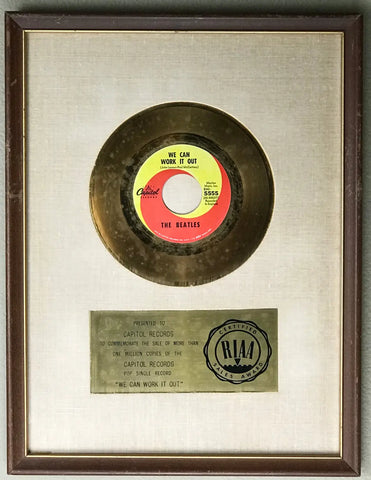 Spotty, but real. Sometimes authenticity isn't perfect...
Spotty, but real. Sometimes authenticity isn't perfect...
4. Price: Isn't a good deal a good deal? Well, yes, but it depends. Very occasionally, a genuine RIAA can be found for a great deal. More often, however, the collector market has informed the seller and they price an award according to collector market demand, which can be quite high for the most desirable awards from classic artists. This is all relative of course. Is $600 a realistic price for an 80s "flower hologram" type RIAA award for a moderately successful 80s pop or rock artist presented to a record label executive? Sure, sounds about right. Is $600 a realistic price for Led Zeppelin 70s "floater" style RIAA award for 1976 album Presence presented to Robert Plant, which would be a highly-coveted award? No. A realistic price would be more in the thousands, and quite likely many thousands. Want to know the top prices paid for RIAA awards based on known auction results? Check out our article here.
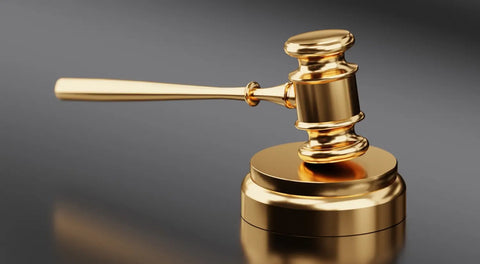
Learn the prices that authentic awards sell for to be informed...
5. If it seems too good to be true... It's an old adage, but it certainly applies in the case of RIAA awards. It's also worth considering the seller. Is it likely that one seller can have dozens of old RIAA awards in pristine condition at any given time, most presented to the artist or individual group members? No, it is not likely, because artist presentations are the rarest and they simply do not appear that often. There are sellers out there who we will not name who consistently have many, many desirable artist/title RIAA awards. And not just newer awards, rather even the most desirable titles from the 1975-81 "floater" award era and also 1964-74 "white matte" type awards. The Beatles, Bob Dylan, Elton John, Led Zeppelin, Queen and other very collectible artist awards are constantly in their listings. They throw some other more obscure artists in as well to present the appearance that they are not just making the most desirable awards. These unscrupulous sellers are clearly making these awards in violation of the RIAA trademark, since they hold no license from the RIAA to manufacture awards. Look for signs that an award was made recently, such as a pristine appearance, or incorrect materials not used in the respective award era. True aged appearance is hard to replicate in an award. Look for and carefully assess awards for artificial aging that a seller may have performed in an attempt to give it an authentic appearance.
To conclude this article, let us say that we do all we can at MusicGoldmine to sell only authentic RIAA and other record awards. We have spent a great deal of time studying the history and details of awards in order to aid in this effort. Among other research, we have interviewed the founder of the New York Frame & Picture Co. (the RIAA's first official and exclusive award manufacturer from 1964-75) and employees of other award makers to learn as much as we can.
We pledge to continue gathering knowledge and experience that will enable us to offer only authentic RIAA and other record awards. We also hope to arm collectors with this knowledge so that they can use it to their benefit as they buy awards. Good luck in your collecting!
Check out our current selection of RIAA Gold and Platinum and other record awards for sale here.
Want more content like this? If you're not a subscriber already, sign up for our free MusicGoldmine newsletter which comes out once a week. Go here to sign up plus get a code for 15% off your first purchase.
Be the envy of all your friends! Get MusicGoldmine.com Music History in your Facebook feed each day. Just follow us on Facebook here.
All award photos © MusicGoldmine.com


